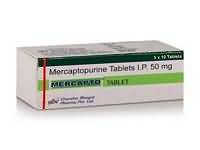CLINICAL USE
Antineoplastic agent:Acute leukaemias Inflammatory bowel disease (unlicensed)
DOSE IN NORMAL RENAL FUNCTION
Usual dose is 2.5 mg/kg/day, but the dose and duration of administration depend on the nature and dosage of other cytotoxic agents given in conjunction
PHARMACOKINETICS
DOSE IN RENAL IMPAIRMENT
GFR (mL/MIN)
DOSE IN PATIENTS UNDERGOING RENAL REPLACEMENT THERAPIES
IMPORTANT DRUG INTERACTIONS
Potentially hazardous interactions with other drugsAllopurinol: decreased rate of metabolism of mercaptopurine – reduce dose of mercaptopurine to a quarter of normal dose
ADMINISTRATION
Reconstition
–
Route
Oral
Rate of Administration
–
Comments
–
OTHER INFORMATION
Absorption of an oral dose is incomplete, averaging ~50%. This is largely due to first pass metabolism in the liver (less when given with food). There is enormous inter-individual variability in absorption, which can result in a 5-fold variations in AUCIt is extensively metabolised (by intracellular activation). At conventional doses clearance is primarily hepatic. Renal clearance may become important at high dosesThe active metabolites have a longer half- life than the parent drugWellcome UK recommend consideration be given to reducing the dose in patients with impaired hepatic or renal function, although no specific dosing guidelines are availableWith renal impairment, the following dosing intervals have been suggested: 24–36 hrs for CrCl of 50–80 mL/min, and 48 hrs for CrCl of 10–50 mL/min. (Summerhayes M, Daniels S (eds). Practical Chemotherapy – A Multidisciplinary guide. 1st ed. Abingdon: Radcliffe Medical Press Ltd. 2003. p. 384)A recent study on anti-cancer drug renal toxicity and elimination concluded that the dose of 6-mercaptopurine does not require modification in patients with decreased renal function (except in conjunction with allopurinol). This study also gives % excreted unchanged in urine as 21%.
